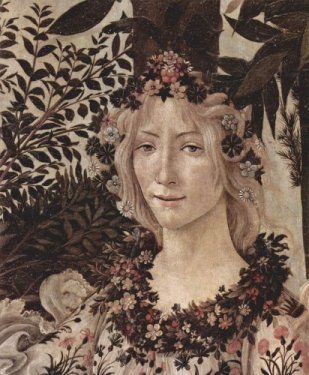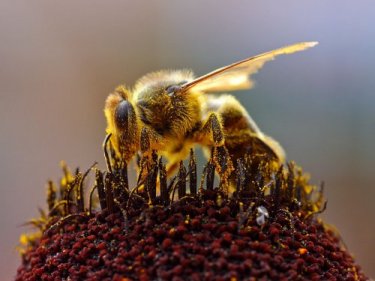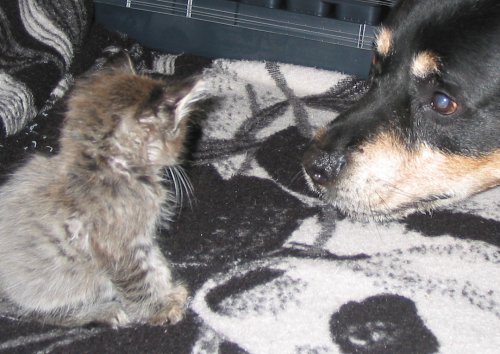May 15, 2009
flitting from flower to flower, exulting in the color, shape, and scent of spring. Each one is more beautiful than the last. I needed to worship someone for making flowers, so I looked up Flora, the Roman goddess of flowers, and found some amazing artwork to worship as well. (Uh-oh — she’s worshiping graven images!)

From Botticelli to Rembrandt, many people before me have felt driven to seek out a higher power responsible for flowers, and to give thanks. Rembrandt painted his Floras as plump women who appear pregnant. Others have painted her with one bare breast. Always she’s surrounded by or bedecked with flowers.
Botticelli’s Flora (above) looks a bit gaunt to me, and worried. Does she fear Mellona will be late sending the bees this year? (Mellona was the Romans’ name for the protector of bees.) Flora needn’t worry if she’s in my neighborhood. The bees are out in force, ecstatically worshiping flowers all over the place.

Note: The photo of the bee is by Jon Sullivan and made available by him to the public domain via PD Photo.org. Thank you, Jon! Thanks to Wikipedia, too.
— Barbara @ 6:47 pm PST, 05/15/09
May 3, 2009
 click to enlarge
click to enlarge
Our home office is in the second bedroom, where we’ve removed the closet doors and added storage shelves. As soon as she was big enough to jump that high, Tara began insisting that one particular spot, on a shelf at about my eye level, was hers. She started pushing things out of the way, and wouldn’t leave it alone. Finally I gave in and cleared a space for her. (The shelf doesn’t really sag, that’s a trick of the lens.)
She’s asleep there right now, so shhh!
Cats always know their place. Humans can only get out of the way.
— Barbara @ 5:04 pm PST, 05/03/09
April 19, 2009
Today is our local Avocado Festival. I don’t plan to go this year. My spouse went very early, before the crowds arrived, for some fresh produce and a carne asada burrito.
I would’ve titled this post with the name of the actual festival we had here in town today, except that I’m going to criticize it a little bit, and I don’t want to cast a shadow over that particular event for any locals who otherwise enjoy it. My criticism isn’t about just our Avocado Festival.
The positive side is, I’m eating a strawberry. That’s always a good thing. In fact, I’m rich today, with three little baskets of strawberries and a good week or two’s supply of avocados. Not only that, we got some of the avocados for free, from a local business near one of the avocado packing plants. Presumably they’re cast offs from the preparation for the festival, since they aren’t very pretty ones. But they’re still delicious, and dead ripe, so I already got to enjoy some for breakfast. My favorite way to eat avocado is mashed with salt and pepper and spread on toast. Since I live with my favorite bread baker, this is the ultimate easy (for me) and delicious breakfast.
My rant is not about the immense crowd that will be there later today, even though I’m not a crowd person. I can handle crowds, and even enjoy them, in small doses. My rant is not about the local vendors who show up each year. It’s not even about the non-local vendors who show up there. After all, everybody’s got to make a buck, right? Some of the vendors are wonderful.
You can get the best local tacos, tamales, and burritos at our Avocado Festival that you’ve ever eaten, and there’s always a nice supply of fresh avocados, of course. Then there’s the standard fair fare, funnel cakes and lemonade and . . . well, the list goes on. We don’t buy most of that standard fair food, so I’m not even aware of what it all is. We usually go for the Mexican food. Some of it’s not available year round, even here, because it’s from groups or businesses that put out a special effort just for the festival. It’s a rare treat, and one of the great draws of the festival for us in the years we attend.
In the years that we attend, we’ve learned to walk there early, as soon as the booths are opening. That way we avoid the biggest crowds and the worst heat.
I’m not sure why, but the day of the Avocado Festival is always hot, even though we can get some pretty cool weather in April. Three days ago we had a high of something like 67 degrees Fahrenheit and the nighttime temp dipped into the low 40s. I wore long sleeves all day, and sometimes a sweater. Yesterday the high was over 80, and today promises to be at least that. (Update, it got up to 93 in town today!) But as usual, of those two weather patterns, the festival happens to fall on the warmer day. Or should I say the warmer day happens to fall on the festival day — the festival was planned well in advance.
Because of the heat and the larger size of the crowd later in the day, and some combination of those factors that seems to make everyone tired and cranky by afternoon, the feeling of the late day crowd changes in a way that becomes distinctly unpleasant for me. So if I don’t go early, I’m not likely to go at all. In fact, I’d just as soon the booths opened at six in the morning rather than nine.
What bothers me about the festival is now fairly universal, I suspect, to local festivals and fairs all over the country. There are very few locals selling handcrafts and artwork anymore. Many of the vendors that sell non-food and non-produce items — and some of the food vendors as well — have traveled from other places. Some of them make the rounds of, possibly, every local festival and county fair in the state, and maybe more than one state. Some are from industry, manufacturers’ representatives selling things like secure mailboxes and automatic sprinkler systems, the sorts of things you expect at home shows and trade fairs, not unique to an Avocado Festival. Some are selling manufactured clothing and home decoration items that I can buy at a department store or a swap meet. The traveling vendors have always been around, but lately they seem to be the only ones. Where are the locals? To me this trend of increasing numbers of non-local vendors is like finding the same chain restaurants everywhere you travel. That used to disappoint me when traveling on business. If there’s any perk to having to take business trips, it’s discovering local eateries that are unique to the city you’re visiting. But if you travel to another place only to eat at Outback or Chilis, you might as well have stayed home. Why go to the local festival to buy the same items that will be sold at the county fair two months from now? More importantly, why go to find items you can buy at the department or hardware store? The point of a local festival, I thought, was to find things that can be found in only one place, to celebrate that location’s unique qualities and products.
I’m glad that we still have some local businesses that sell food and a few other items there. In the years I attend, if I go early, I can pick and choose which places to visit, and I usually enjoy myself. But I miss the kinds of things we used to see more of and that I always loved festivals and fairs for: handcrafts, local artists’ work, and those really unique and unusual items that once were only found at local fairs. They seem be rare these days, almost extinct.
I’m sure there’s a reason for this. Perhaps it has to do with the process of arranging to sell at one of these events, that it’s become so business-oriented that it shuts out local artists and craftspeople. Perhaps people don’t have time anymore to make things themselves and arrange to sell them locally unless that’s their full time business. If it is their full time business, they likely have to travel from fair to fair to make it pay off year-round.
We see some of those traveling vendors selling beautiful things, like handmade herbal soaps, stunning hand-carved gourd art, and some unique pottery. It’s great stuff, and I’m glad it’s there. But, whatever the reason it’s not there, I still find the lack of local handcrafts and artwork at these events sad. I know some of the vendors hate it when I ask, “Are you from around here?” But I continue to ask. It doesn’t mean that I won’t buy what they’re selling, if I love it and can afford it. But I can’t help being more enthusiastic about finding local goods that I love at our local festival.
The only other rant I have is, where are the hats? This is the time of year our warm weather sets in. In the past I’ve arrived at the festival only to wish I’d brought a hat. I can’t be the only one. There used to be hats for sale all over the place there. I usually bought my hat there to use for yard work or walking around in the sun for any reason, because it was the right time of year and they had a nice selection for good prices. Last year I hardly saw any hats. Maybe they were there and so few that I never came across them. I hope at least the hats were back this year.
Last year, too few local handcrafts, too few hats. This year I’m not going to the festival. Can anyone connect the dots?
Maybe the real problem is that I’m not like other people who attend. Maybe most people prefer mass-manufactured, universally available things. Who knew that would become the major draw of a local festival? Maybe it’s just me.
In any case, I’m happy for the strawberries and avocados. It’s a good day.
— Barbara @ 11:09 am PST, 04/19/09
April 13, 2009
I’ve been in a horribly bad mood, mainly due to family troubles of the kind that make me feel helpless and small — the news of the death of my oldest brother, and my dad’s loss of independence due to a stroke. I’ve also had some just silly bad luck at home, little things like stubbing a toe so hard a few days ago that I worried it was broken (it’s still sore), straining my back lifting a bag of cat litter yesterday, frustration over the economic crunch that everyone is feeling, when I really could use a newer more reliable car. Why is it that bad news and events seem to come in these overwhelming groupings that feel as if they’ll never end — or, if that isn’t what’s happening, why is it that my mind seems to make even the small problems feel big, once it starts on a downward spiral?
Today I knew I needed to crawl out of this hole I found myself in. I’ve been avoiding the news, because that usually just makes me feel worse, and worse was definitely not what I needed. I know some people think that’s an unrealistic attitude, but I find the news unrealistic, in its focus on everything bad and very little good except nonsensical news about the personal lives of celebrities — people who would likely just as soon be left alone when it comes to personal matters.
I decided to search for some positive news on the Internet, and I found this story on a blog called Great Pet Net that I thought I should share in case anyone else could use a lift: Jasmine the Mother Theresa Greyhound. Dogs tend to have a healing way about them, all around, in my opinion. But this one is exceptional. She certainly had a distant healing effect on me.
It’s a beautiful spring day here. Flowers are blooming, in spite of the gopher that keeps eating them. (Our gopher loves California poppies and nasturtiums. What does yours like?) The The Hooded Orioles arrived early from Mexico, and one almost flew right into me yesterday, maybe because I was wearing green and blended with the plants. Later I watched three Red-tailed Hawks circle the sky above our house. Clouds sail across the sky today in a stiff, delicious ocean breeze. My cat Tara is always up for a game of chase or a tumble with toys. Someone I care about is playing Bach on the piano in the next room.
Yesterday I spotted a long, sinuous cloud in the western sky that looked like a Japanese dragon. I didn’t get a picture, but if you’re familiar with the animated film, Spirited Away, it looked a lot like Haku in his natural form as a river spirit.
Now that I’ve set my mind back in its more customary direction, at least for the moment, good things are beginning to happen inside me again, too.
Every now and then I find it necessary to keep a gratitude journal, to find at least three things each day that I’m grateful for to write about. I think I’ll take up that practice again for a while.
— Barbara @ 4:30 pm PST, 04/13/09
March 27, 2009
We have crane flies like crazy here right now. I’ve always called them mosquito hawks, but apparently they don’t eat mosquitoes (and we’ve already had a few of those).
Tara’s pretty good at catching bugs. She loves to chase the crane flies that get into the house. I’m not sure which is worse, though, pesky crane flies, or a flying cat. She’ll leap, climb, or fly wherever in the house she needs to go in order to catch one. She got so busy hunting them a few nights ago that she didn’t even eat the chicken I gave her. They must be very tasty bugs.
Fortunately I stowed most of our breakables away when she was smaller, because now she’s a force to be reckoned with when she goes flying through the house after a bug. It’s almost like having a monkey on the premises. An eight-pound fur ball flying at you is no laughing matter. She proved that a few days ago when she knocked over my office chair. I wasn’t in it, I just came running when I heard the crash from the other room, and found the chair lying on its back on the floor with one of its adjustment knobs broken off. I think it had something to do with a running, flying leap into it from front to back. A few days later she tried to knock me over, seated in the chair, with an unbelievably football-like tackle for one so small. No claws were used, it was all in fun, of course, but what a cat. I think her Siamese is showing.
Mice beware. Do not enter here.
— Barbara @ 11:57 am PST, 03/27/09
January 11, 2009
I’m rereading a favorite book in a new form, and watching some old TV shows I’d forgotten were so good, so it’s been a week of favorites for me and I thought I’d share.
I’m also a little desperate for something to blog about, and I must be growing jaded, because my favorites are old, and sadly far too few.
Favorite Books:
J.R.R. Tolkien’s The Hobbit and The Lord of the Rings. I’m currently reading The Annotated Hobbit, an edition annotated by Douglas A. Anderson. I’m loving it, though I think most of the annotations will be something to enjoy on my second reading of this edition. It’s been so long since I read the story, that I find myself just sticking to the story and not reading footnotes (marginal notes in this case). But I did read the introduction, and immersed myself in some fascinating biographical and publishing history. Now and then my gaze veers into the margins and my curiosity is piqued.
I decided to read this story again because I’ve read that Peter Jackson is finally involved in a film adaptation of it, which I’ve looked forward to ever since the LOTR trilogy that he produced and directed. This time I want to view the film adaptation fresh from the written story, rather than from the perspective of more than a decade of fogging over of my memory as I did with the trilogy. Which means I’m reading it now and likely will read it at least once more before the film is released.
I’m also rereading this, and plan to reread LOTR, because the film trilogy has become a mini-obsession of mine and yet every time I watch the movies I keep thinking how much I want to read the books again.
Tolkien is easily my most favorite author, ever. I’d be hard pressed to name a second favorite who comes anywhere close. Maybe it was his relationship to language, as a philologist. He also had a deep, abiding love of the fairy story and ancient poems and songs. (Many of his dwarves’ names are borrowed from the Elder Edda.) I like that he was unapologetic about his errors. He didn’t try to hide them and, if it made sense he fixed them in later editions. If fixing them didn’t make sense, he lived with them without shame or excuse. He was still a teen when he began to create his own language, that of the elves that he used in his stories, incorporated so elegantly into the film version of LOTR a few years ago. Tolkien wrote circles around anyone else, and almost singlehandedly invented the modern fantasy genre. He seems to have recalled something both childlike and ancient, and filled it with something else profoundly basic to humanity, all of which make him seem himself to have been a wizard — of storytelling. Stories are his version of Gandalf’s fireworks, and even of Gandalf’s defeat of the Balrog and death. Tolkien is pretty much at the top of the mountain and well beyond compare, in my opinion. All the rest, even my other favorite authors, are still down there in base camp, wondering about the weather up there on high. Keeping in mind that when climbing the highest mountains in the world, just getting to base camp is something, nothing to sneeze at. Most of my favorite books that even come close to Tolkien’s, though, are older, the authors also long dead.
This makes me wonder if we’re ripe for a literary renaissance. And when I say literary, I mean a STORY renaissance. Preparatory to that, if Tolkien’s work isn’t now required reading in school, I think it should be. I would love to see a new generation fall in love with language and with story.
Favorite TV series:
Star Trek The Next Generation. There’s no comparison, and even viewing old dilapidated recordings of it compares favorably, in fact stunningly so, to most of what I see on TV today.
I was saddened to hear of the death last month of Majel Barrett, and I felt as if her death marked the end of an era (started by her husband, Gene Roddenberry) in science fiction and in television.
While watching old Star Trek TNG episodes, I can’t believe how often I have to reach for tissues because a story line touched me deeply, or I’m still amused by the always tasteful humor some 20 years later, or I’m struck dumb by a profound insight or bit of ageless wisdom. At the same time it’s immensely entertaining, and frequently filled with suspense. There’s nothing like it.
I have a second favorite TV series — actually two sister ones: Stargate SG-1 and Stargate Atlantis. Still, Star Trek the Next Generation is another top of the mountain favorite that is difficult to compare to anything. Who knows, Tolkien himself might even have loved it.
I like The Closer, mainly because the female lead is a character, someone I can relate to. She’s over thirty and still attractive, but it’s not in-your-face plasticized starlet attractiveness. Kyra Sedgwick is beautiful in a way that goes beyond starlet appeal, and you get the impression this is a woman who’s actually honest-to-god aging and struggling to maintain, rather than magically stopping time until the powers that be disappear her from TV as soon as she shows signs of (horrors!) appearing to be over forty. She holds her own in a man’s world without needing to act like a tough chick. She’s spunky and vulnerable, and she doesn’t have to show us the inside of the body as the bullet passes through it for cheap thrills, or make us help examine the vomit under a microscope or eat bugs (honestly, some TV cannot be viewed while enjoying dinner), or be right there for the bloodiest new surgical procedure of the century, spurting arteries and all. I need some mystique left in my mysteries, some characters I can relate to, and not to feel as if I have to learn how not to be squeamish along with the interns in my medical shows. I also wonder why there are so interminably many “realistic” detective and medical shows. Isn’t there anything else to write about, guys? Is the sitcom dead? I guess so.
I like Ghost Whisperer, though I’ve discovered it only recently, so we’ll see how that works out.
I liked Dead Zone, until they killed off Walt the sheriff. I thought he provided an important obstacle between Johnny and his former love, Sarah. Conflict in the form of strong romantic and other obstacles is critical to good series fiction, even a paranormal series that has a new problem to solve each episode. Without the core conflicts and tension to fall back on, a series falls flat because no one seems to be trying very hard, day to day. They’re just biding time until the next psychic flash, murder, ghost, mystery disease, or demon appears. A good series has several backup sources of tension. In Star Trek TNG, nearly every character has a known source of personal conflict that’s always simmering just under the surface, and the series as a whole is full of those tensions sometimes rising, and frequently interacting with others’ conflicts. Killing Walt off, in The Dead Zone, was like letting Marshall Dillon marry Miss Kitty, or letting The Fugitive catch the one-armed man. You just don’t do that, until the very last episode ever. The End.
All that said, I would be hard pressed to come up with new series or episodes from season to season and week to week as the best TV writers do.
Maybe we need a television renaissance as well as a literary one.
Barring that, we may need to let all the Marshall Dillons marry all the Miss Kittys in a big Sun Myung Moon style wedding — and then give TV one big funeral service and be done with it. Most of the shows are so lame, and the commercial breaks are so long these days, that I frequently leave the room to finish the dishes, make a snack, or check my email, and then lose interest and forget to return to see how the show ends. They say there’s nothing new under the sun, and television, as a whole, seems to be trying awfully hard to prove it.
Do you have any new/old favorites to share? What entertains you these days?
— Barbara @ 9:34 pm PST, 01/11/09
December 11, 2008
As I get further into middle-age, I’m sure I’m not the only one who questions now and then how good my memory still is. At one point today, while doing laundry, it occurred to me how many details we remember about something as simple as laundry, with all the clothing items we own and the differences in how best to wash them.
There’s a lot to remember while doing laundry. Each item seems to have its unique quirks, and I remember them all, once I’ve washed the items once or twice. I always dread washing a new item the first time. Washing instruction tags are sometimes dead wrong. You never know what will happen. When washing something new, all standard sorting rules apply, and then some. Once I get to know an item I can relax certain rules.
I remember it all, from washing day to washing day. Which items can be washed together? Which need to drip dry? Which are safe to bleach, and with chlorine or the other kind? And so forth. I remember long past laundry errors, such as washing a bright red shirt years ago with some whites and winding up with lots of pink. I remember exactly which red cotton shirt did that, because I loved it and refused to get rid of it even after it ruined other things. (I only washed it with black clothing from then on.) I wore it until I wore it out.
I remember that this red t-shirt I own now can be washed safely with almost anything and at almost any temperature, and I shudder to think what chemicals or polluting processes were used to get it so colorfast. I also sometimes worry that I’ll grow so complacent about that shirt’s colorfastness that I’ll make the red shirt error in the future with another red shirt. I remember where I bought certain clothing items, how long I’ve had them, and in some cases who gave them to me. I have some pretty old clothes, so that’s some fairly long term memories. I remember to turn one particular shirt that I hardly ever wear inside out to dry it, because otherwise the metal buttons will make so much noise in the dryer that they drive me to distraction. I remember which item is made of so clingy a fabric that it has to drip dry, or it will pick up every speck of lint in the load, even with an anti-static dryer sheet — even if I don’t cut the dryer sheet in half to save money. I remember which wool socks are the type of wool that won’t felt, and I happily toss them in with everything else.
As I finished loading the dryer for the last time today, I thought doing laundry provided a decent test of my memory, and I felt great about the state of my memory. I felt great, that is, until I paused before closing the dryer door, and couldn’t for the life of me recall whether I’d tossed in a dryer sheet.
— Barbara @ 3:59 pm PST, 12/11/08
July 29, 2008
because we brought him home on the 4th of July. But we always called him Indi. I started out spelling his nickname Indy, while his “dad” started out spelling it Indi. But it always sounded the same to him.
We never called him Independence, and come to think of it he wasn’t independent. He made friends everywhere he went, and in his first obedience class he was voted No. 1 Puppy. He never chewed up anything he wasn’t supposed to, but he knew what to do with a rawhide bone, and in his prime he could demolish a large one in short order. As a puppy he surgically removed squeakers from toys, and wore out several plastic balls until they no longer squeaked.

Green was his favorite color. I know dogs are supposed to be color blind, but Indi always preferred the green balls to the blue ones or red ones. We tested this, several times.
He liked to be wherever we were, and most recently he was my gardening buddy. He wanted to follow me outside whenever I worked in the back yard, even when he was too old and sick for it to be much fun for him.

Indi died last night, after 10 years of faithful, loving companionship. He was the best dog we’ve ever known, and we feel honored to have had the chance to live with him.
We miss you, dear friend, and we won’t be at all surprised if you’re voted Number 1 Puppy in Heaven.

— Barbara @ 6:46 pm PST, 07/29/08
May 17, 2008
I’ve always been a cat person, and my spouse converted soon after we got together. Our dog is a cat person too, since he grew up with cats. Ever since Emily died in August, Indi has been lonely and bored. He started acting like a very old dog. We’re apparently boring, depressing people for a dog to own unless he has a cat around to spice things up, and he’d known and loved Emily all his life. Well, things got spiced up again yesterday, but good.
Meet Tara, named for the Goddess Tara, revered in Tibetan Buddhism as well as in Celtic lore. Cats are supposed to be worshiped, right? Tara thinks so.


In the second photo she’s making friends. Any time she ventures near her new doggy friend she receives a great big juicy kiss on the face, which of course any cat should be delighted to receive. Especially if she just finished washing the last kiss off her face. Indi also loves to get swatted in the face. I think Emily taught him to see that as fun, as a former owner had Emily de-clawed. Indi realized earlier today that Tara comes fully loaded, though she only swats when she’s playing.
We were a little concerned about the introduction, since lately Indi’s become enthusiastic about chasing strange cats out of his back yard. But when his new kitten was introduced as a member of the pack, he happily reverted to baby sitter. Tara took to him with no hissing, having been born into a home with dogs. She knows the drill. Avoid doggy kisses by cruising behind furniture and darting under beds. Especially after the doggy has just taken a long drink of water. (Very drippy business.) Indi is getting old, which you can tell by all that white fur on his face where it used to be mahogany. But having a kitten around has put a smile on all our faces and zest in our steps. (Handy when there’s a kitten darting about underfoot.)
— Barbara @ 4:42 pm PST, 05/17/08
March 15, 2008
Have you ever had trouble deciding which topic to read about next, or what to major in in college? Has anyone ever told you that you have too many hobbies? Have you ever thought about leaving a perfectly good job to look for something else that might interest you more — even if it doesn’t pay more? Maybe you’re a generalist.
This past Saturday, Dave Pollard at How To Save the World linked to an essay in his Links of the Week that he described as brilliant and liberating, and I agree.
The essay, by William Tozier of the Notional Slurry blog, is titled, There are exactly two ways: one, and many. The two ways he discusses are specialization and generalization.
William Tozier proposes the notion that we’re all evolved to be generalists, that specialization isn’t normal. I tend to agree when I consider that many of our forbears were more general in their skills and knowledge than we are. Even today, skills tend to be more generalized in humans living closer to nature, and survival in a wilderness requires a lot of flexibility.
When I think about it, the only things our earliest ancestors planned was to survive, and they were never sure how they would have to do that. The only things they finished were a good meal when food was available, or a new tool or garment when an old one wore out — often taking time to add improvements or embellishments, so even they were never finished. They paused to take in their world and observe it. They learned from everything around them. They were creative, they were nomads, and they were students of life. They paid attention to what came their way, they took them as signs of what they needed to do, for now.
William Tozier discusses the problem of explaining to specialists what we generalists do, how to label ourselves in today’s world. It can be a problem, and I think this must be why, long ago, I started to think of myself as a writer. Aside from having an aptitude for English and composition, a writer has to read and learn about many things in order to do what she does. Writing provides an excuse to research anything and everything, as possibly relevant to a project. Later still I began referring to myself as a creative person, because that can involve lots of different interests too, even more than writing. It can encompass activities that are finished when they’re finished, or never finished, rather than finished to deadlines. Of course writers have deadlines, if they hope to make money at it, and there the generalist has to adapt to the specialized modern world.
I conformed to the specialized world for years, in being a reliable employee and meeting deadlines. I glued myself to my chair and focused on my job. I met deadlines, and earned awards and promotions for my conformity and work ethic. But I wasn’t happy. I didn’t even feel healthy doing that. Eventually it became habit, and I got so I felt uneasy if I didn’t have a plan. So then I was really stuck — uneasy with my schedule and commitments, and uneasy when I didn’t have any.
After a lifetime of thinking I wasn’t doing life right, that I needed to be more energetic, and get more done, finish more things, I feel relief and satisfaction to realize that I’m a generalist and always have been — and there’s nothing wrong with that. It explains so much. Some people may think of being a generalist as a bad thing and call us dilettantes, or unwilling to commit, and some may even think it’s a sign of a problem, one of those recently defined mental disorders for which there always conveniently seems to be a new drug. (When did we start inventing diseases to match the drugs instead of the other way around?) Heaven forbid any of us should be anything but cookie cutter normal, whatever that means. In our culture it apparently means we have to specialize in something, we have to plan everything out, have goals and deadlines, in order to succeed. We have to finish long lists of things, and fill every minute with structured activity.
Today we don’t just have a work ethic, we have a work ethic on steroids.
I for one am ready to stop the madness. If we were intended to plan everything out, then why do we need artificial planners like Daytimers, Palm Pilots, and Blackberries? If we’re supposed to have jam-packed calendars and meetings overlapping meetings, then why didn’t we evolve to keep our schedules in our heads, and to be in two places at once? If we were supposed to travel the same road everyday, then why do we love vacations so much?
Unfortunately, being generalists brings some of us less material success in life, since it’s much less likely that we decide on distinct, well-defined career paths, and even if we do, we get this itch to change careers now and then. We’re looked down on when we tend not to finish things to a schedule — and I agree that makes sense when others are depending on us to finish so they can do their things. We’re often better off working on our own, to our own schedules, which are pretty much nonexistent, and without anyone else depending on us conforming to a schedule. Sometimes we’re called Jacks of all Trades.
Provided you figure out eventually that this is how you’re supposed to be, that there’s nothing wrong with you for wanting less structure and commitment in your life, being a generalist can bring a great deal of freedom and happiness. After all, what makes you happier than being yourself, no matter how many directions that may lead you?
I’m a generalist, and have been all my life. I’m grateful to finally figure this out. Thanks, William and Dave.
— Barbara @ 12:22 pm PST, 03/15/08












